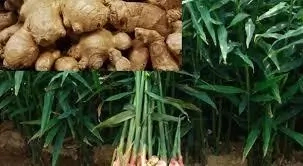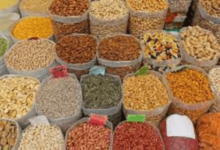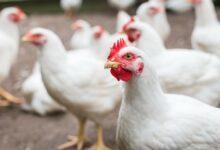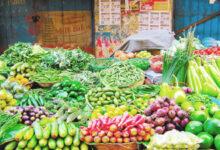9 Steps to Start Ginger Farming in Nigeria and Tips to Succeed
Here in this post, we are going to bring you steps to start ginger farming in Nigeria and tips to succeed. We hope you find this informative.
Definition of Ginger
Ginger (zingiber officinale) is a herbal flowering plant whose rhizome is widely used as a spice or a medicine. It is a perennial plant.
👉 Relocate to Canada Today!
Live, Study and Work in Canada. No Payment is Required! Hurry Now click here to Apply >> Immigrate to CanadaIt is an underground rhizome of a small herb plant belonging to the Zingiberaceae family, which also belongs turmeric. It is of the genus Zingiber. Ginger is the common name. The primary plant used medicinally is Zingiber officinale.
Read Also: 11 Steps to Start Tomato Farming Business in Nigeria

The Origin of Ginger in Nigeria
The origin of ginger can be traced to the southern part of Asia but over time, has been distributed to other parts of the world.
The cultivation of ginger in Nigeria, started way back in 1927 in Southern part of Zaria, Jemma federated district and the neighboring parts of Plateau State.
But today, Ginger is cultivated nationwide. Ginger is also a very important export crop in Nigeria. It is valued for its powder, oil and oleoresin. Currently, Nigeria is ranked 4th in global ginger farming.
Read Also: How to Start Vegetable Farming in Nigeria
Factors to Consider Before Starting a Ginger Farm
Before one starts ginger farming in Nigeria, various factors are considered. These factors should be taken seriously as they would determine your success.
The Environment
The sunlight and rain must be put into consideration as ginger doesn’t grow in direct sunlight. It needs warm weather. Ginger grows well in a sheltered place.
👉 Relocate to Canada Today!
Live, Study and Work in Canada. No Payment is Required! Hurry Now click here to Apply >> Immigrate to CanadaIt also needs sufficient water, so water must be available in the environment your ginger farm is to located. Manual watering can also provide water for your ginger plant.
Planting your ginger with some other plants (eg;peas and beans) can easily provide the adequate amount of sunlight, as these plants can help in shading it from direct sunlight.
Soil
Ginger rhizomes thrive in loose, rich and moist soil. It also loves mildly acidic soil with a pH of 5.5 to 6.5. Loamy soil is the perfect soil for ginger farming. It also drains water which prevents the ginger plants from becoming water logged.
Season
The best time for planting ginger rhizomes in Nigeria, should be 2-3 weeks before the rainy season starts. But heavy rainfall can be harmful to your plants.
Read Also: 8 Steps to Start Maize Farming in Nigeria
Steps to Start Ginger Farming and Tips to Succeed
After, the above factors have been considered, the next thing one looks into, are the steps which ensures your success in ginger farming. These steps are as follows:
1. Land Preparation
Preparing the land requires the thorough tillage and removal of all grasses. The area should be well drained as water stagnation pre-disposes the plants to infection.
The ginger bed should be about 15cm in height and 1-meter in width. The smallest distance between 2 rows must be kept at 20cm.
2. Collecting Ginger for Farming
The ginger collected for farming should have yellow brownish skin and should be free from pests and diseases. If you collected new ginger which has not yet grown outside thick yellow brownish, it should be kept in direct sunlight for 3-7 days, to enable it grow the old skin.
You can plant as they are but cutting them into parts is beneficial. The ginger plant will take the rhizome as its own root and grow new root from them.
The rhizome should be cut 2-3 weeks before planting into parts. Each part cut off must hold at least one eye and should weigh at least 4-6g. It can be cut according to your preference with a variance of 1-3 inches. Each cut part is called a sett.
3. Planting
Ginger rhizomes are planted by burying each sett in a hole. The hold should be about 8cm deep or more. The budd of each sett should be pointing upwards in the soil. Each sett should have a space of 30cm from another sett. Each sett grows into a new ginger plant.
Read Also: Problems And Prospects Of Onion Farming In Nigeria
4. Fertilization
Fertilization is a key factor in a successful ginger farming. Ginger plant should be fertilized each six to eight weeks. Well rotten cow dung or compost can be used. Ginger plant requires heavy manuring.
Ginger requires certain elements to grow. These elements are:
- a) Nitrogen: which is essential for proteins and amino acids.
- b) Phosphorus: which performs a vital part of respiration. It also helps to stimulate fresh root extension.
- c) Potassium: which is necessary for yeast activation, osmosis and transpiration.
Fertilizers like N. P. K 15:15:15 can provide these elements for your ginger plant. It can be gotten from most agrochemical stores in Nigeria.
This fertilizer is applied twice. The first time, about 20 days after planting. It should be applied at the rate of 4 bags per hectare.
The second time of application should be about 40 days after first. It should be applied at the rate of 2 bags per hectare. Urea is used during the second time of applying fertilizer.
5. Pest Detection And Control
Snails, mites, borers and nematodes are few among the major pests that harm ginger plants. Keeping your ginger farm neat and clean is the key to controlling pests on your ginger farm. Insecticides can also be used in the case of mites.
If your ginger plant is attacked by a borer, sprout out the shoots infested by the borer, cut open the shoot, pick out the caterpillar and destroy them. Regular farm surveillance and sanitation are necessary for pest management.
6. Disease and Control
Soft rot, damping off and rust are some of the diseases that affect ginger. Hand extraction can be used to control the spread of such diseases.
If any of the disease is noticed, the affected clumps are to be removed carefully along the soil surrounding the rhizome to reduce the spread.
Chemicals can also be used. Trichoderma may be applied at the time of planting and subsequently if necessary. Restricted use of Bordeaux mixture (1%) ion can come into place if your farmland area is prone to diseases.
7. Harvesting
This is the most anticipated time of any ginger farmer. This step in ginger farming reveals how successful you are as a ginger farmer.
The harvesting of ginger in Nigeria usually starts in October and runs all through to may. Harvesting time of ginger should be after 8-10 months of planting.
However, if you want fresh ginger that will be used for vegetable purpose, it should be harvested after 6 months. Fully matured ginger has yellow leaves and dry pseudo stems. Ginger rhizomes are lifted with a digging fork or a spade. They are then cleaned of soil particles and roots.
STORAGE: Ginger can be stored in the fresh state or dried state. The fresh ones should be stored in a cold environment in between 10 to 15 degrees centigrade..
Storing in dried state involves the following steps;
*It should be cleaned carefully and thoroughly using only fresh water.
*It should be cut into pieces to help dry faster.
*It should be dried under the sun.
*After drying, the dried ginger should either be stored as it is, or grounded into powdered form.
*It can be stored in either bags, glass or tin containers.
Read Also: 7 Steps To Start Plantain Farming Business In Nigeria
General Success Tips
Cultivating ginger constantly in the same piece of land may cause low production. It is advised that after 2-3 years of frequent farming, one year break should be given to the farmland. Using organic compost will also be helpful.
Also, when planting ginger rhizomes, consider some good companions for ginger that will provide weed cover, insect repellent and natural mulch.
Legumes like Peas, Chili peppers and Turmeric are especially useful as they fix nitrogen in soil for better overall plant growth.
Finally, make sure any ginger plant companions share the same growth needs as this would ensure the success of your ginger plant.
Wishing you a successful ginger farming experience.





